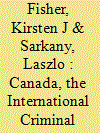| Srl | Item |
| 1 |
ID:
162477


|
|
|
|
|
| Summary/Abstract |
Given the history of the International Criminal Court in Africa, the relationship between African states and the Court is particularly significant to its legitimacy. If the power of the Court is grounded in international political support and the perception that it transcends international and national politics to deny impunity for ‘atrocity’ crimes, the Court's perceived legitimacy and normative legitimacy are so intertwined that charges of illegitimacy from significant regional stakeholders hold particular weight. More importantly, criticisms voiced by African actors point to a valid challenge to the Court's legitimate moral standing as an arbiter of global justice: the international power imbalance that seems to be becoming more entrenched and apparent in the Court's work. Tactics adopted by some African leaders of prioritising the issue of heads-of-state immunity, however, minimise the broader issue of power differentials and reduce the chance that African states will find allies in their cause to challenge the Court's operations.
|
|
|
|
|
|
|
|
|
|
|
|
|
|
|
|
| 2 |
ID:
167219


|
|
|
|
|
| Summary/Abstract |
In 2018, Prime Minister Trudeau made two announcements regarding the International Criminal Court, both, it seems, aimed at reinforcing Canada’s claim of human rights promotion and multilateralism: Canada declared Myanmar’s actions against the Rohingya people genocide and urged the United Nations Security Council to refer the situation to the International Criminal Court, and it joined a collective referral of the Venezuela situation to the Court. As public measures of support, these are positive developments for the International Criminal Court, which has been suffering poor public relations and challenges to its legitimacy. However, Canada could do more by better supporting the financial viability of the Court. Currently, it aims to increase the Court’s workload without supporting an increased budget, as reflected in Canada’s involvement at the December 2018 Assembly of States Parties meeting. A seemingly sure way to undermine the International Criminal Court would be to add to its workload without ensuring it has the financial resources to do the work.
|
|
|
|
|
|
|
|
|
|
|
|
|
|
|
|